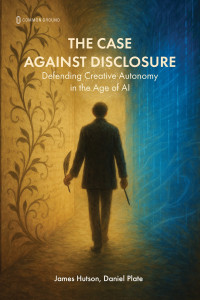The Case Against Disclosure: Defending Creative Autonomy in the Age of AI

October 1st, 2025 - 10AM CST
The Case Against Disclosure: Defending Creative Autonomy in the Age of AI challenges the prevailing assumption that creators must disclose their methods when using artificial intelligence. As AI tools become deeply embedded in writing, research, coding, and artistic production, institutions, publishers, and the U.S. Copyright Office have moved toward transparency mandates, requiring creators to document and reveal the extent of AI assistance in their work. This book argues that such demands are neither ethically justified nor practically enforceable, representing an unnecessary and damaging encroachment on the creative process. Transparency, often framed as a safeguard for authenticity and accountability, is instead an instrument of control—one that reinforces outdated notions of originality while failing to account for the realities of AI-driven authorship. The Case Against Disclosure dismantles the myth that process defines authorship, asserting that credibility stems from the willingness to take responsibility for a work, not from exhaustive documentation of how it was made. Through legal analysis, historical parallels, and contemporary case studies, this book exposes how transparency mandates create unnecessary barriers, restricting creative autonomy and imposing impractical bureaucratic oversight on the production of knowledge and culture. Essential reading for scholars, policymakers, and professionals in media, law, and technology,this work presents a forceful argument against institutional overreach, advocating for a future in which creators retain full control over their methods. It is both a scholarly intervention and a polemic, making the case that the right to opaque creation is fundamental to intellectual and artistic freedom in the AI age.